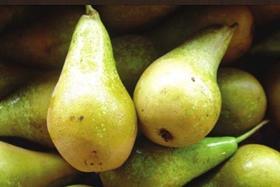
Last year, Belgian pear exporters clung on to the one slice of luck they were afforded, an early start to the season, which provided them with a much-needed additional two weeks to sell a bumper crop in the absence of their biggest market, Russia. This time around, the Russian ban remains, but no extra time; in fact, the season is due to start a couple of weeks later, with the first volumes of early Conference variety Corina expected in mid-August and the main Conference crop beginning in the second week of September.
“This gives us a bit longer to sell the old crop, but the old Conference is now losing its quality, so we will probably have a month-long gap before the arrival of the Corina,” says Tony Derwael, president of Bel’Export. “I think this is good. It draws a line between the two crops. But unfortunately it means two weeks less to sell, which will be around 5 per cent of the entire crop. Last year, we enjoyed an early start so this is a big difference.”
As for Russia’s recent announcement of a year’s extension to its ban on food imports from markets including the European Union, this is clearly not good news, says Derwael. “Russia is still the best market, especially for the Conference variety,” he explains.
Bel’Export sold a lot of volumes last year to Russia’s neighbours. How this campaign goes will depend to a large extent on how strict the Russian authorities are on re-exports from such countries. “Despite the crop being around 20-30 per cent higher, we somehow sold the whole lot,” says Derwael. “The extra weeks helped, as did the lower euro compared with the dollar and some other currencies.”
According to Derwael, the Russian authorities are likely to be stricter if there are viable alternative sources available. “That is my concern,” he says, “particularly since Turkey has a bigger crop this year.”
Bel’Export’s natural response to the disappearance of its principal market has been to seek alternatives. “We need to be build these alternative markets up step by step,” says Derwael. “We are trying to send to Brazil, as well as to the US, trying to develop an audience. We have been disappointed with the US, as it is still closed to us – this is a big political issue.”
“The Canadian market is an interesting one,” he goes on, “but it is quite small. The two main markets are Vancouver and Toronto and they are thousands of miles apart. Also, Canadian consumers know Packham and William, but not Conference – we are trying to educate consumers with tastings, but this will take time and money.”
The Middle East Derwael views as a tougher prospect, due to the intense competition on the market and the general lack of consumer interest in the Conference variety. In India, the company is trialling some shipments, but Derwael doesn’t hold out much hope. “The Lucas variety would be better on this market,” he says.
More promising by far is the East Asian market. “We have done some loadings for China,” says Derwael. “Most went to Hong Kong, as this is a very western market so the Conference is well known. But the rest of China doesn’t know the variety, so, as in Canada, this will take time and money to develop, but there are many interesting cities to explore, including Shenzhen, Shanghai and Beijing.



